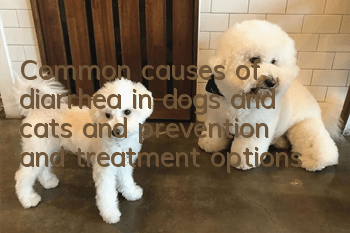Common causes of diarrhea in dogs and cats and prevention and treatment options

Diarrhea is when an animal excretes feces with a higher than normal water content, accompanied by an increase in the frequency, fluidity, or volume of feces. The British survey questionnaire showed that 14.9% of the dogs surveyed had diarrhea in the past 2 weeks. Among the dogs that went to the veterinary hospital, 28.6% had diarrhea, and 2.2% of the dogs came to see the doctor because of diarrhea.
Classification of diarrheaDiarrhea can be divided into acute diarrhea and chronic diarrhea (lasting more than 3-4 weeks) according to time. It can be divided into small intestinal diarrhea and large intestinal diarrhea according to the location. According to whether there is infection, it can be divided into infectious diarrhea and non-infectious diarrhea.
Acute diarrheaFood intolerance, sudden changes in food, viral, bacterial and parasitic infections, hemorrhagic gastroenteritis, intussusception, stress syndrome, poisoning, acute pancreatitis and adrenal insufficiency, etc.
Chronic diarrheaFood intolerance, parasites, inflammatory bowel disease, antibiotic-responsive enteropathy, exocrine pancreatic insufficiency.
Infectious diarrheaDiarrhea caused by intestinal infection by various pathogens, including viruses, bacteria, parasites and fungi.
Characteristics: Infectious diarrhea caused by viruses, bacteria, etc. often has fever symptoms and often manifests as vomiting. In bacterial diarrhea, mucus and even pus and blood-like substances are often visible in the stool, and the amount of each bowel movement is not large; in viral diarrhea, the stool is often thin and watery, and the bowel movement is large and dehydration is prone to occur.
Non-infectious diarrheaThe main types of diarrhea caused by no pathogen include increased intestinal osmotic pressure, digestion and absorption disorders, abnormal intestinal peristalsis and abnormal intestinal secretion.
Characteristics: Non-infectious diarrhea, often due to food-borne factors, indigestion, the presence of raw food particles in the stool, without fever, and occasionally vomiting.
Treatment of diarrhea-symptomatic treatmentFor diarrhea, the key points of symptomatic treatment are to re-establish three-dimensional fluid, electrolytes and acid-base balance. Usually, animals with moderate to severe diarrhea require intravenous infusion. Antidiarrheal drugs can be used when it is difficult to maintain body fluid and electrolyte balance due to excessive defecation. Severe enteritis often causes vomiting, and centrally acting antiemetics are more effective than peripherally acting antiemetics.
Treatment of diarrhea - treatment of the causeInfectious diarrhea: viral diarrhea: serum, albumin, monoclonal antibodies, etc.; bacterial diarrhea: antibiotic treatment; parasitic diarrhea: Internal anthelmintics. Non-infectious diarrhea: Food intolerance diarrhea: Control diet and choose hypoallergenic foods. Inflammatory bowel disease: Corticosteroid immunosuppressants given for several weeks for exocrine pancreatic insufficiency and other diseases.
Treatment of diarrhea-controlling dietAfter diarrhea occurs, you usually fast for 24-36 hours, and then give foods with high digestibility, a small amount of soluble fiber and a medium fat content, and eat less and more for 3-4 days.
Protein: In intestinal diseases, it is very necessary to use high-quality protein. Protein is an important substance for the normal operation of the body. Especially for chronic small intestinal diseases (protein malabsorption and protein-losing enteropathy), caution should be used in cases of food allergies. Choose a protein type.
Carbohydrates: In cases of small intestinal diarrhea, monosaccharides and disaccharides, especially lactose, should be avoided or reduced because they increase intestinal osmotic pressure. Rice is the best raw material because of its high digestibility and the resulting osmotic pressure. Pressure down and promotes the absorption of water and electrolytes.
Fat: It is the most complex type of nutrient to digest and absorb (mainly relying on pancreatic lipase and bile salts). The intake of appropriate fats has a positive impact on the treatment of diseases, such as omega-3 fatty acids.
Common antidiarrheal drugsMedications to control diarrhea. Antidiarrheal effect by reducing intestinal motility or protecting the intestines from irritation. It is suitable for severe diarrhea or long-term chronic diarrhea to prevent excessive dehydration, water and salt metabolism disorders, digestive and nutritional disorders.
Change gastrointestinal motility: enhance gastrointestinal tension, inhibit intestinal peristalsis, and prevent propulsive contractions, thereby slowing down the advancement of food and allowing full absorption of water. Commonly used drugs include compound camphor tincture and atropine sulfate
Adsorbents: can absorb gases, bacteria, viruses and exotoxins in the intestines and prevent their absorption and damage to the intestinal mucosa, such as medicinal charcoal, etc.
Astringent protective agents: can form a protective film on the intestinal mucosa to protect it from irritation, including tannic acid protein, bismuth carbonate, etc.
Bismuth Subcarbonate Tablets - Gastrointestinal Mucosal Protective Agent for Dogs - Vomiting and Diarrhea: It is suitable for dogs with common gastrointestinal mucosal injuries, such as bacterial, viral, dog vomiting and diarrhea caused by changing dog food or food poisoning. Protect gastrointestinal mucosa from damage. When taking drugs that are highly irritating to the gastrointestinal tract, they can be used together to reduce damage to the gastrointestinal mucosa. Suitable for indigestion and other symptoms in puppies.
- What's wrong with my dog's stomach twitching?
- The tragedy of purebred dogs: How did humans lead them to a dead end?
- A dog's attitude towards its owner can be seen from its sleeping posture!
- Why do pets get poisoned when they eat onions? What should you do if your pet gets poisoned after eating onions?
- What should I do if my short-legged and long-bodied Terrier loses hair?
- How to train a three-month-old dog to listen to its owner’s commands? Dog training methods!
- Why does a dog vomit green water?
- The Pomeranian is growing in popularity, what solidifies its place in the pet dog world!
- How can a foreign company raise a baby well if its dog works overtime? Necessary knowledge for office workers to raise a dog
- What is the best way to raise a one-month-old puppy?



